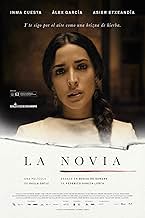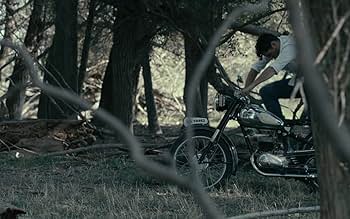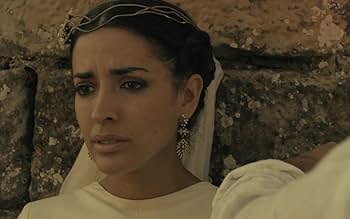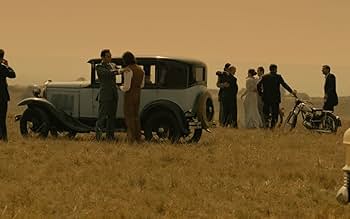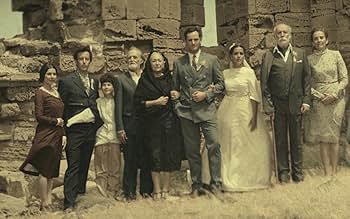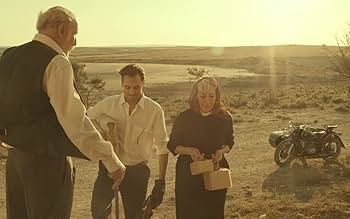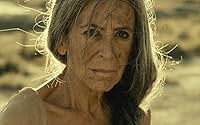IMDb रेटिंग
6.6/10
3.6 हज़ार
आपकी रेटिंग
अपनी भाषा में प्लॉट जोड़ेंAs the Bride and the Groom prepare for the wedding in the pale desert, a tale of unappeased desires, forbidden yearnings, and conflicted choices unfolds. Now, three lovers stand powerless be... सभी पढ़ेंAs the Bride and the Groom prepare for the wedding in the pale desert, a tale of unappeased desires, forbidden yearnings, and conflicted choices unfolds. Now, three lovers stand powerless before the true nature of man. Is fate unavoidable?As the Bride and the Groom prepare for the wedding in the pale desert, a tale of unappeased desires, forbidden yearnings, and conflicted choices unfolds. Now, three lovers stand powerless before the true nature of man. Is fate unavoidable?
- निर्देशक
- लेखक
- स्टार
- पुरस्कार
- 19 जीत और कुल 34 नामांकन
Carmela Labordeta
- Novia Joven
- (as Carmela del Campo)
फ़ीचर्ड समीक्षाएं
Greetings again from the darkness. The pitch for this movie might have come across as blending a Greek tragedy with a romance novel, and then adding a dash of revenge. Fortunately director Paula Ortiz's vision for the Federico Garcia Lorca play "Bodas de sangre" is more poetic and lyrical than such an overview would suggest.
Love triangles are the core of many stories and movies, but it's the opening sequence here that clues us in that the trouble has already occurred, and though it removes some of the suspense of "what", it certainly sets the stage for an interesting "how" and "why".
Beautiful Inma Cuesta plays Novia (billed only as the titular bride) who is engaged to Asier Etxeandia (billed only as Novio, the groom). The abundance of family stress (on both sides) has little to do with the wedding plans, and more to do with Leonardo (Alex Garcia). Leonardo is more than the local hunk who is always lurking about on horseback; he's also the third wheel who can't let go of his desire for Novia in spite of his young child and pregnant wife. To make things messier, Novia seems to answer his heightened desire for her with her own uncontrollable passion for him.
It's Yin and Yang. Safe and Dangerous. The bride's conflicted choice leads the groom's mother (Goya winner Luisa Gavasa) to be a foreboding presence throughout, and keeps most of the village on edge. Additionally, there is an element of mysticism as Maria Alfonsa Rossa appears periodically as the figure of death – and we are never quite sure of the motivations behind her advice.
Goya winner Miguel Amoedo provides beautiful cinematography that balances between fantasy, harsh realities, and the romance of the moment. There are many intimate close-ups, as well as some stunning desert wide shots of Leonardo riding the horse. The score and soundtrack are terrific, including Soledad Velez with a haunting version of Leonard Cohen's "Take this Waltz".
The concept of destiny vs. choice hovers over most scenes, and the twisted family and childhood histories give the film a Shakespearian feel. Last year, the film received numerous Goya nominations (including Ms. Cuesta, Ms. Ortiz, Mr. Garcia) are resulted in the wins for Ms. Gavasa and Mr. Amoedo. It may not make the best Valentine's Day date movie, but it is an interesting watch from the romance-tragedy-revenge-horseback genre.
Love triangles are the core of many stories and movies, but it's the opening sequence here that clues us in that the trouble has already occurred, and though it removes some of the suspense of "what", it certainly sets the stage for an interesting "how" and "why".
Beautiful Inma Cuesta plays Novia (billed only as the titular bride) who is engaged to Asier Etxeandia (billed only as Novio, the groom). The abundance of family stress (on both sides) has little to do with the wedding plans, and more to do with Leonardo (Alex Garcia). Leonardo is more than the local hunk who is always lurking about on horseback; he's also the third wheel who can't let go of his desire for Novia in spite of his young child and pregnant wife. To make things messier, Novia seems to answer his heightened desire for her with her own uncontrollable passion for him.
It's Yin and Yang. Safe and Dangerous. The bride's conflicted choice leads the groom's mother (Goya winner Luisa Gavasa) to be a foreboding presence throughout, and keeps most of the village on edge. Additionally, there is an element of mysticism as Maria Alfonsa Rossa appears periodically as the figure of death – and we are never quite sure of the motivations behind her advice.
Goya winner Miguel Amoedo provides beautiful cinematography that balances between fantasy, harsh realities, and the romance of the moment. There are many intimate close-ups, as well as some stunning desert wide shots of Leonardo riding the horse. The score and soundtrack are terrific, including Soledad Velez with a haunting version of Leonard Cohen's "Take this Waltz".
The concept of destiny vs. choice hovers over most scenes, and the twisted family and childhood histories give the film a Shakespearian feel. Last year, the film received numerous Goya nominations (including Ms. Cuesta, Ms. Ortiz, Mr. Garcia) are resulted in the wins for Ms. Gavasa and Mr. Amoedo. It may not make the best Valentine's Day date movie, but it is an interesting watch from the romance-tragedy-revenge-horseback genre.
Based on the old Spanish play about a wedding tragedy. It all sets in the rural Spain and tells the story of a bride who involved in a love triangle. It takes us back to her childhood day to reveal us her crush on one of two friends, but feudal between the friends families puts her in a tight spot. Especially as growing up knowing she has to choose one of them to marry. Finally the time comes to that, the day is set for the big occasion, but an unexpected twist brings a chaos during the celebration and the old rivalry awakens among the young generation.
It was a little dull narrative, mostly because of the quietness and lack of depth in both the character explorations and the story. I might say it is only a finishing touch work, we can't get any details we want for a better understanding, especially the past events remains slightly mysterious like how it all began. That's fine, because they thought they chopped away the boring stuffs, and yes they did, yet that did not bring any good result either.
Anyway, this film's focus was the three friends who grew up together, so this story is only about what happens around them. Beside them, the old woman who often appears is a puzzle that's need to be explained. But I assumed she's kind of witch who manipulating the peoples mind to go against each other.
Since it revolves on a wedding event, I was desperately looking forward the ceremony to begin. That's the other reason I felt letdown for it to delay. Until then the pace was too slow to keep myself engaged with this, but once the celebration began, it lit up my mood and followed by the conclusion that came with a light speed. So I kind liked the third act in the entire narration and according to me, that's the best part of the film.
"Bitterness is the worst punishment of all."
There's nothing much happens in the story section, we can easily know what's coming up next after the each scene. Because like I said, there's no great developments, everything was about getting ready for the marriage and during the marriage. It is like learning everything about it prior to the watch, yet the final scene, the solution was stronger than I expected. For an end like that I expected tearjerker atmosphere. The emotions showed between the characters, but for the viewers those are ineffective.
Shot in the cool places, I mean it looked like a semi-desert that did not bring the Spanish atmosphere of my knowledge, but blended well with the story. The character executions were fine, even the direction was good, but the writing was a disappointment. This 80 year old story needed a serious update, because the presentation was very stylish, but the tale was so simple. Yes, it looks so simple to follow, but complicated to fully understand it.
Just keep in mind that it is not a romance nor a revenge film, but a slice of equal both. About other things as well like love, life, family, culture, especially the three main characters linked with, such as the bride's choice, the groom's fate and the their friend's deception. This is definitely not an entertaining film, not for people like me, but what I call it is a story to decode. Like in the line of 'Enemy', 'Upstream Color', 'Borgman' et cetera. There're lot more about it than what actually the story tells, but only discussing with others who had watched it will bring the details out. Honestly, I was not very impressed with this, certainly not a bad film to ignore it completely.
6½/10
It was a little dull narrative, mostly because of the quietness and lack of depth in both the character explorations and the story. I might say it is only a finishing touch work, we can't get any details we want for a better understanding, especially the past events remains slightly mysterious like how it all began. That's fine, because they thought they chopped away the boring stuffs, and yes they did, yet that did not bring any good result either.
Anyway, this film's focus was the three friends who grew up together, so this story is only about what happens around them. Beside them, the old woman who often appears is a puzzle that's need to be explained. But I assumed she's kind of witch who manipulating the peoples mind to go against each other.
Since it revolves on a wedding event, I was desperately looking forward the ceremony to begin. That's the other reason I felt letdown for it to delay. Until then the pace was too slow to keep myself engaged with this, but once the celebration began, it lit up my mood and followed by the conclusion that came with a light speed. So I kind liked the third act in the entire narration and according to me, that's the best part of the film.
"Bitterness is the worst punishment of all."
There's nothing much happens in the story section, we can easily know what's coming up next after the each scene. Because like I said, there's no great developments, everything was about getting ready for the marriage and during the marriage. It is like learning everything about it prior to the watch, yet the final scene, the solution was stronger than I expected. For an end like that I expected tearjerker atmosphere. The emotions showed between the characters, but for the viewers those are ineffective.
Shot in the cool places, I mean it looked like a semi-desert that did not bring the Spanish atmosphere of my knowledge, but blended well with the story. The character executions were fine, even the direction was good, but the writing was a disappointment. This 80 year old story needed a serious update, because the presentation was very stylish, but the tale was so simple. Yes, it looks so simple to follow, but complicated to fully understand it.
Just keep in mind that it is not a romance nor a revenge film, but a slice of equal both. About other things as well like love, life, family, culture, especially the three main characters linked with, such as the bride's choice, the groom's fate and the their friend's deception. This is definitely not an entertaining film, not for people like me, but what I call it is a story to decode. Like in the line of 'Enemy', 'Upstream Color', 'Borgman' et cetera. There're lot more about it than what actually the story tells, but only discussing with others who had watched it will bring the details out. Honestly, I was not very impressed with this, certainly not a bad film to ignore it completely.
6½/10
"At the heart of all great art is an essential melancholy", Spanish dramatist Federico Garcia Lorca's own words which also aptly describe La Novia, a new filmic adaptation by Paula Ortiz of his 1932 play, Bodas de Sangre (Blood Wedding), a tragedy which details a bride's indecision when she is torn between her newly-wedded husband, and her lover. I went to see this film at a Spanish cinema in Cadiz this week with friends, and I was not at all disappointed. Although I have never studied this particular play, I am quite familiar with Lorca's other work, having analysed his Romancero Gitano (Gypsy Poetry) at University and his equally influential play, La Casa de Bernarda Alba (The House of Bernarda Alba), at Grammar School. Throughout his work, Lorca's sympathy is always with the lower classes, from which come his protagonists. Lorca's own story is an interesting and melancholic one, coming from a wealthy farming background in Andalucia, and growing to dislike his status of wealth, and identifying instead with the lowly.
Not only was Lorca troubled by his own social identity, he was also homosexual, which, you will see, adds another dimension to his written work and which, along with his status as a political dissident in the Spanish Civil War, led to his brutal assassination at the hands of the Civil Guard. I digress... La Novia is a beautiful film which makes wonderful use of long shots to capture the warm, bare, aridity of Spanish countryside, almost a metaphor for death and devastation which the transgression brings in the story. It was, I imagine, almost a given that this film would win this year's Goya Award for Cinematography, with thanks to Miguel Amoedo. For the average film-goer, the plentiful, expressive shots may lag, and may be seen as "art for art's sake". All the same, one cannot deny the awe they inspire. In terms of the acting, Inma Cuesta is wonderful in the part of the bride, and often looks strikingly like a young Penelope Cruz. Equally great are the bride's love interests; Asier Etxeandia, who plays the husband; and Alex Garcia, who plays Leonardo, the lover. Spanish film aficionados will also be able to recall Luisa Gavasa, a stalwart of Spanish cinema, who stuns with her performance as the husband's mother - a character beset with horrific premonitions of a disastrous marriage. The music, by Shigeru Umebayashi, is also stirring.
Lorca also said in his lifetime that "In Spain, the dead are more alive than the dead of any other country in the world." This new (filmic) lease of "life" for Lorca is clear proof of this statement. As I have already seen, Spain is a country which refuses to forget its past, literary, filmic, or otherwise.
Not only was Lorca troubled by his own social identity, he was also homosexual, which, you will see, adds another dimension to his written work and which, along with his status as a political dissident in the Spanish Civil War, led to his brutal assassination at the hands of the Civil Guard. I digress... La Novia is a beautiful film which makes wonderful use of long shots to capture the warm, bare, aridity of Spanish countryside, almost a metaphor for death and devastation which the transgression brings in the story. It was, I imagine, almost a given that this film would win this year's Goya Award for Cinematography, with thanks to Miguel Amoedo. For the average film-goer, the plentiful, expressive shots may lag, and may be seen as "art for art's sake". All the same, one cannot deny the awe they inspire. In terms of the acting, Inma Cuesta is wonderful in the part of the bride, and often looks strikingly like a young Penelope Cruz. Equally great are the bride's love interests; Asier Etxeandia, who plays the husband; and Alex Garcia, who plays Leonardo, the lover. Spanish film aficionados will also be able to recall Luisa Gavasa, a stalwart of Spanish cinema, who stuns with her performance as the husband's mother - a character beset with horrific premonitions of a disastrous marriage. The music, by Shigeru Umebayashi, is also stirring.
Lorca also said in his lifetime that "In Spain, the dead are more alive than the dead of any other country in the world." This new (filmic) lease of "life" for Lorca is clear proof of this statement. As I have already seen, Spain is a country which refuses to forget its past, literary, filmic, or otherwise.
This is a Passionate and Extreme Movie plenty of love , drama , tragedy and death . It deals with the story of a love triangle between two young men (Asier Etxeandia , Alex Garcia) and a woman (Imma Cuesta) , the Bride , who is a Triumph of Beauty. Inseparable since childhood, the Bride and the Groom share a gentle, and yet, ardent passion, stronger than the desolate, exposed and stark land that encircles them and perhaps even stronger than love itself. And the Bride follows through the air, like a blade of grass . Then the Neighbor (Ana Fernández) comes to chat with The Mother (Luisa Gavasa , Goya Academy Award winner ) , and reveals to her that The Bride was previously involved with a man named Leonardo Felix, a relative of the men who murdered The Mother's husband. The Mother, who still hates the Felix family, is furious, but decides to visit the girl before bringing the matter up with The Groom. But the lovers carried away by their passion defying all moral and social habits . Their disobedience will have unexpected consequences. Now riddled with indecision, the fair Bride is due to marry the gentle and stalwart Groom, however, the unconventional Leonardo, a married man (married to Leticia Dolera) with a baby and a mutual childhood friend, still feels the same unrestful, reckless, still, achingly hopeless passion for the Bride. Eventually, as the Bride silently prepares for her wedding , the feeble flesh will soon succumb to carnal yearning , devoured by deception and to the long-boiling passion .
A few of the themes present in ¨Blood Wedding¨ are the cycle of life, the progression of time, conflicted choices, anguish , deception, fate, forbidden yearnings, unappeased desires and nature. The unavoidable fate of three lovers standing powerless before the true nature of man , along with a Freudian reading of the play reveals Lorca to be exploring human nature. The theme of choice is evident in the characters of Leonardo, the bride, and the bridegroom.The theme of fate also ties into the themes of choice and deception. The bride's choice to marry the groom, despite the fact that she still loves Leonardo. This is ironic, because she attempts to choose both men and loses both of them instead. Fate plays an important role in the plot of Blood Wedding, with its plot twists and final outcome. Finally, the theme of nature is present in Blood Wedding: the moon, the trees, the river, death (in the form of the beggar woman), the vineyard, orange blossoms, etc. These references to nature suggest that there is something predetermined in human nature, and relates back to fate. Main cast are pretty good , a decent trio protagonist : Inma Cuesta , Asier Etxeandia , Álex García . Frankly marvelous support cast such as : Luisa Gavasa , Carlos Álvarez-Nóvoa , Leticia Dolera Ana Fernández , Trujillo , María Alfonsa Rosso , Manuela Vellés , Mariana Cordero . It contains a luxurious and brilliant cinematography by Migue Amoedo , set in the middle of the pale desert and barren land . Being shot on location in Cappadoccia, Turkey , Monasterio de Casbas, Huesca, Aragón , El Temple, Huesca, Aragón , Los Monegros, Zaragoza , Aragón, Spain . Sensitive and rousing musical score by synthesizer , being composed by Shigeru Umebayashi . The motion picture was professionally directed by Paula Ortiz .
The play has been adapted as stage as cinemas as TV and translated into English and retitled Bitter Oleander, had a brief Broadway run in 1935. The play was adapted as a Spanish film in 1938, with Margarita Xirgu in the starring role she'd previously played on stage.The play was adapted as an Italian film in 1941, also titled Blood Wedding.The 1957 opera Bluthochzeit by Wolfgang Fortner is adapted from Henrique Beck's German translation of the play.In 1959, BBC Television made an adaptation of the play. In 1964, Vérnász, an operatic adaptation of the play with a score by Hungarian composer Sándor Szokolay, was first produced in Budapest. The opera has been produced again in the years since. In 1973, the play was produced in English translation at La MaMa Experimental Theatre Club in Manhattan, New York.The play was adapted as a Moroccan film in 1977, also titled Blood Wedding. In 1981, Spanish film director Carlos Saura directed a dance film based on the play, also titled Blood Wedding.In 1986, the BBC World Service broadcast a radio adaptation of the play starring Anna Massey, Juliet Stevenson, and Alan Rickman.A 2006 Haitian operatic adaptation of the play, titled Le Maryaj Lenglensou, was produced by Dutch filmmaker Hans Fels with a score by Haitian composer Iphares Blain. A documentary about this production premiered at the 2007 Netherlands Film Festival.In 2007, BBC Radio 3 broadcast a new production of the play, using the Ted Hughes translation and featuring Barbara Flynn as The Mother. Finally , in 2015, this Spanish film adaptation titled The Bride directed by Paula Ortiz was released.
A few of the themes present in ¨Blood Wedding¨ are the cycle of life, the progression of time, conflicted choices, anguish , deception, fate, forbidden yearnings, unappeased desires and nature. The unavoidable fate of three lovers standing powerless before the true nature of man , along with a Freudian reading of the play reveals Lorca to be exploring human nature. The theme of choice is evident in the characters of Leonardo, the bride, and the bridegroom.The theme of fate also ties into the themes of choice and deception. The bride's choice to marry the groom, despite the fact that she still loves Leonardo. This is ironic, because she attempts to choose both men and loses both of them instead. Fate plays an important role in the plot of Blood Wedding, with its plot twists and final outcome. Finally, the theme of nature is present in Blood Wedding: the moon, the trees, the river, death (in the form of the beggar woman), the vineyard, orange blossoms, etc. These references to nature suggest that there is something predetermined in human nature, and relates back to fate. Main cast are pretty good , a decent trio protagonist : Inma Cuesta , Asier Etxeandia , Álex García . Frankly marvelous support cast such as : Luisa Gavasa , Carlos Álvarez-Nóvoa , Leticia Dolera Ana Fernández , Trujillo , María Alfonsa Rosso , Manuela Vellés , Mariana Cordero . It contains a luxurious and brilliant cinematography by Migue Amoedo , set in the middle of the pale desert and barren land . Being shot on location in Cappadoccia, Turkey , Monasterio de Casbas, Huesca, Aragón , El Temple, Huesca, Aragón , Los Monegros, Zaragoza , Aragón, Spain . Sensitive and rousing musical score by synthesizer , being composed by Shigeru Umebayashi . The motion picture was professionally directed by Paula Ortiz .
The play has been adapted as stage as cinemas as TV and translated into English and retitled Bitter Oleander, had a brief Broadway run in 1935. The play was adapted as a Spanish film in 1938, with Margarita Xirgu in the starring role she'd previously played on stage.The play was adapted as an Italian film in 1941, also titled Blood Wedding.The 1957 opera Bluthochzeit by Wolfgang Fortner is adapted from Henrique Beck's German translation of the play.In 1959, BBC Television made an adaptation of the play. In 1964, Vérnász, an operatic adaptation of the play with a score by Hungarian composer Sándor Szokolay, was first produced in Budapest. The opera has been produced again in the years since. In 1973, the play was produced in English translation at La MaMa Experimental Theatre Club in Manhattan, New York.The play was adapted as a Moroccan film in 1977, also titled Blood Wedding. In 1981, Spanish film director Carlos Saura directed a dance film based on the play, also titled Blood Wedding.In 1986, the BBC World Service broadcast a radio adaptation of the play starring Anna Massey, Juliet Stevenson, and Alan Rickman.A 2006 Haitian operatic adaptation of the play, titled Le Maryaj Lenglensou, was produced by Dutch filmmaker Hans Fels with a score by Haitian composer Iphares Blain. A documentary about this production premiered at the 2007 Netherlands Film Festival.In 2007, BBC Radio 3 broadcast a new production of the play, using the Ted Hughes translation and featuring Barbara Flynn as The Mother. Finally , in 2015, this Spanish film adaptation titled The Bride directed by Paula Ortiz was released.
in many senses. not all easy to seduce. slow motion cinematography, landscapes from Capadoccia, poetic images, admirable presence of Maria Alfonsa Rosso and Garcia Lorca play atmosphere. a film who must admire ignoring the story because the first scenes are enough for know the evolution of the relations between characters to the tragic end. and the accuracy to the play is sacrificed for the noble desire to give an art film. result - "La novia" is one of films for a reduced target. a public who discovers more than the good intentions of the director or the changes by the play. a public seduced by atmosphere. by poetry of image. by the similarities with other tragic love stories. a film seduced by costumes and air and broken glass and costumes and old earrings. nostalgia. and justice.
क्या आपको पता है
- ट्रिवियाDirector Paula Ortiz cares immensely about the artistry of the shots and takes, that's why the cast usually had to act through adverse or unpleasant environment conditions. For example, the scene when the bride sings "la Tarara" was filmed in the middle of the desert of Los Monegros at 5 a.m. Actors also had to deal with strong wind (cierzo), blinding light or mosquitoes, or even against the clock filming when the scenes happened at sunset.
- गूफ़The groom chases the unfaithful bride on a BMW R25/2, formerly seen in the film with a sidecar. When he arrives, he rides an unidentified motorcycle (could it be a BSA?) which stalls.
टॉप पसंद
रेटिंग देने के लिए साइन-इन करें और वैयक्तिकृत सुझावों के लिए वॉचलिस्ट करें
- How long is The Bride?Alexa द्वारा संचालित
विवरण
बॉक्स ऑफ़िस
- बजट
- €11,87,147(अनुमानित)
- दुनिया भर में सकल
- $17,79,966
- चलने की अवधि1 घंटा 36 मिनट
- रंग
इस पेज में योगदान दें
किसी बदलाव का सुझाव दें या अनुपलब्ध कॉन्टेंट जोड़ें


![Tráiler [OV] देखें](https://m.media-amazon.com/images/M/MV5BMzg3YWM0YjAtNDg2ZC00ZGE0LWJhYzMtNzg3NjBmYTcxY2FhXkEyXkFqcGdeQXRyYW5zY29kZS13b3JrZmxvdw@@._V1_QL75_UX500_CR0)
![Teaser Tráiler [OV]](https://m.media-amazon.com/images/M/MV5BNTVjMzNlNGEtMDNhNi00MGY1LTgxNzUtZDc3YjA2NGUyODE0XkEyXkFqcGdeQXRyYW5zY29kZS13b3JrZmxvdw@@._V1_QL75_UX500_CR0)
